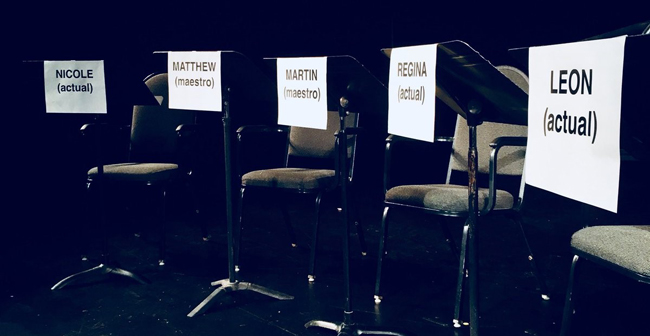Culture
 Photo: Séamus Miller
Photo: Séamus Miller
A Sneak Peek at Work in Progress Tyrant
June 19, 2018 @ 12:00am
True to their mission to “Make Space for Art,” the nonprofit organization, CulturalDC, invited the public to a series of workshops at the Source Theatre’s 100-person black box space to provide feedback on the thought-provoking original play, Tyrant, written by Kathleen Akerley.
Tyrant follows the theatrical trend of law induced alternate realities similar to Hulu’s reworking of Margaret Atwood’s “The Handmaid’s Tale” and HBO’s adaptation of Ray Bradbury’s “Fahrenheit 451.”
Set in the United States, 40 years after the enacting of legislation that presumably solves the homeless crisis across the country, Tyrant explores the power dynamics that come when the ultra-wealthy force homeless citizens to work in exchange for lodging. Eliciting woeful calls from onlookers, the theme parallels the prison-industrial system enforced today in hundreds of for-profit prisons nationwide. Overflowing with racial and class-based oppression, Tyrant challenges viewers to evaluate their roles in the ongoing systemic oppression.
This particular workshop was a reading which allowed commenting, questioning, and a restructuring of roles, per the audience’s recommendation, after Act One. The goal was to explore scene functionality “when racial demographics are altered” according to CulturalDC.
With three “Actuals” and two “Maestros” name tags on seats across the intimate stage, scene one opens with a glacial-like air (both figuratively and literally), foreshadowing unfortunate actions to follow.
Martin, a maestro, is the homeowner played by a Caucasian male. He is a wealthy man (the source of his wealth is unknown) who has manifested upwards of 10 Actuals from the “Center” to perform certain tasks in his home. He has a chef, two massage therapists, nurses, drivers and a therapist.
His persona straddles the line between a sympathetic endearing supervisor and a threatening manipulative tyrant.
Shown interacting with Martin in act one are two Actuals; Leon and Regina, Martin’s massage therapists. Leon is played by a Caucasian male and Regina is played by a female of African descent.
Martin’s wealth is quickly obvious, as he lavishes himself with daily massage treatments, on each occasion sharing his dreams with Leon and Regina. Each session reveals a bizarre dream while they rub away the tension formed from a long day of no labor.
Regina and Leon have differing experiences prior to being placed with Martin. Regina, presumably in her mid-twenties, grew up in the Center where Actuals are raised and trained to work for Maestros. From birth, she was taught the laws of servitude and obedience. Whereas Leon, of a similar age, was raised by his mother until her sudden disappearance, before eventually becoming an Actual as well.
Both are happy and thankful to work in Martin’s home, as the Maestro provides lodging, food, clothing and even a small degree of companionship. Still, ambivalence weighs down the pair as they try to obey each law perfectly. Otherwise, their utmost fear of being reassigned or returned to the Center is unavoidable.
In this complex alternate reality, the laws are comprehensive but oppressive. The law surfacing continually prohibits Actuals from thinking or pretending as though they are not Actuals. They must always be an Actual, never aspiring to be anything more. Once an Actual, forever an Actual; they cannot purchase freedom, and there is no expiration for servitude.
Another law that echoes from the intercoms for all to hear is silence-time, which happens sporadically and ranges 5-10 hours a day. This period is a relevant restriction geared to ensure Actuals enjoy adequate rest to guarantee their ability to perform their jobs. During this time they must not talk, work or perform any other activity.
Their ability to work is fundamental to their involvement in the program. Similar to solitary confinement for those with behavioral problems in prison, if they do not work, they must return to the Center for correcting.
Fortunately, the laws not only apply to Actuals. Maestros have their own set of regulations to abide by once they’ve acquired and manifested an Actual. Maestros cannot make Actuals uncomfortable, and inflicting pain is prohibited. Instead, Maestros provide reports detailing their experience and all incidents that transpire. Any violation found leads to the immediate removal of Actuals and the expulsion of the Maestros in question.
It is clear an attempt was made to form a utilitarian society harvesting the labor found in slavery but without its cruelty and violence. But with absolute power, absolute corruption follows.
In the case of Tyrant, the oppression of the homeless population is overt proof of corruption. Many implicit tactics are used to facilitate tyranny, such as the restriction on education. The rationale for restricting slaves’ educational development was that if slaves could read, they could aspire and plot to be more than slaves. Though Actuals can read, access to real-world experiences and knowledge is restricted.
In a particular daunting scene, Regina injures herself on a scolding hot tea kettle, unlawfully gifted by Leon. Once confronted by Martin, due to her inability to massage him, it’s evident Regina had no conception of healing. During an exhausting exchange between Martin and Regina, where Martin attempts to manipulate Regina to strike fear in her, he eludes to her inability to perform her job. With this proclamation, she ascertains her hand-use will never be regained and begins to spiral, as the fear of returning to the Center is upon her.
After the close of act one, playwright Akerley asked the audience if they would like to see any actors in a different role. She forewarns the audience, disclosing sexually violent graphic scenes are to occur in the second act. Which led one individual to ask that the female actor, playing Regina, be removed. She was reassigned to the role of Martin, after an understudy praised her portrayal of the character from previous performances. The audience member explains the reasoning behind his recommendation, sharing his discomfort with “seeing” harm done to a woman of African descent by a white male, explaining it “hits too close to home.”
With Regina cast as a Caucasian female and Martin a woman of African descent, the second act continues without skipping a beat.
Once the show concluded and the heinous sexual act transpired, comments and questions poured from the audience.
One woman asked, “What is the ideal audience you see watching your play?” Akerley responded, “white middle and upper-middle class,” with the purpose of inciting a reaction or sense of responsibility to resolve systemic racial and class-based oppression.
Audience members questioned the inclusion of violent sexual acts, suggesting this form of assault is heavy handed. To counteract both claims offered by these individuals, another actor proposes their inability to address or confront oppressive acts against minorities (women and people of color) further perpetuates the cycle of injustice. Because we live in a society where crimes persist against those presumed to be at the lower end of these power dynamics, there is a need for dramatic portrayals reinforcing that progress is still needed.
On a later call, Akerley explains the importance of race in the production of this piece of work. Reminiscing about a 2014 field production in Chicago, where an entirely Caucasian, and outstanding, cast provoked a lackluster conversation. She recalls conversations about the legality of legislation and the potential enactment of this law, rather than the treatment of marginalized individuals and the stripping of fundamental liberties like freedom, love and prosperity.
Akerley hopes future producers will cast the play in a way that “make[s] conversations productive.” She feels it is her obligation, as a playwright, to make audiences uncomfortable, yet willing to grapple with and confront the disparities produced by society.
Tyrant is in the final editing stages and will premiere in a DC theater in 2019. To see upcoming Longacre Lea productions, visit here and to learn more about CulturalDC events at visit here.







